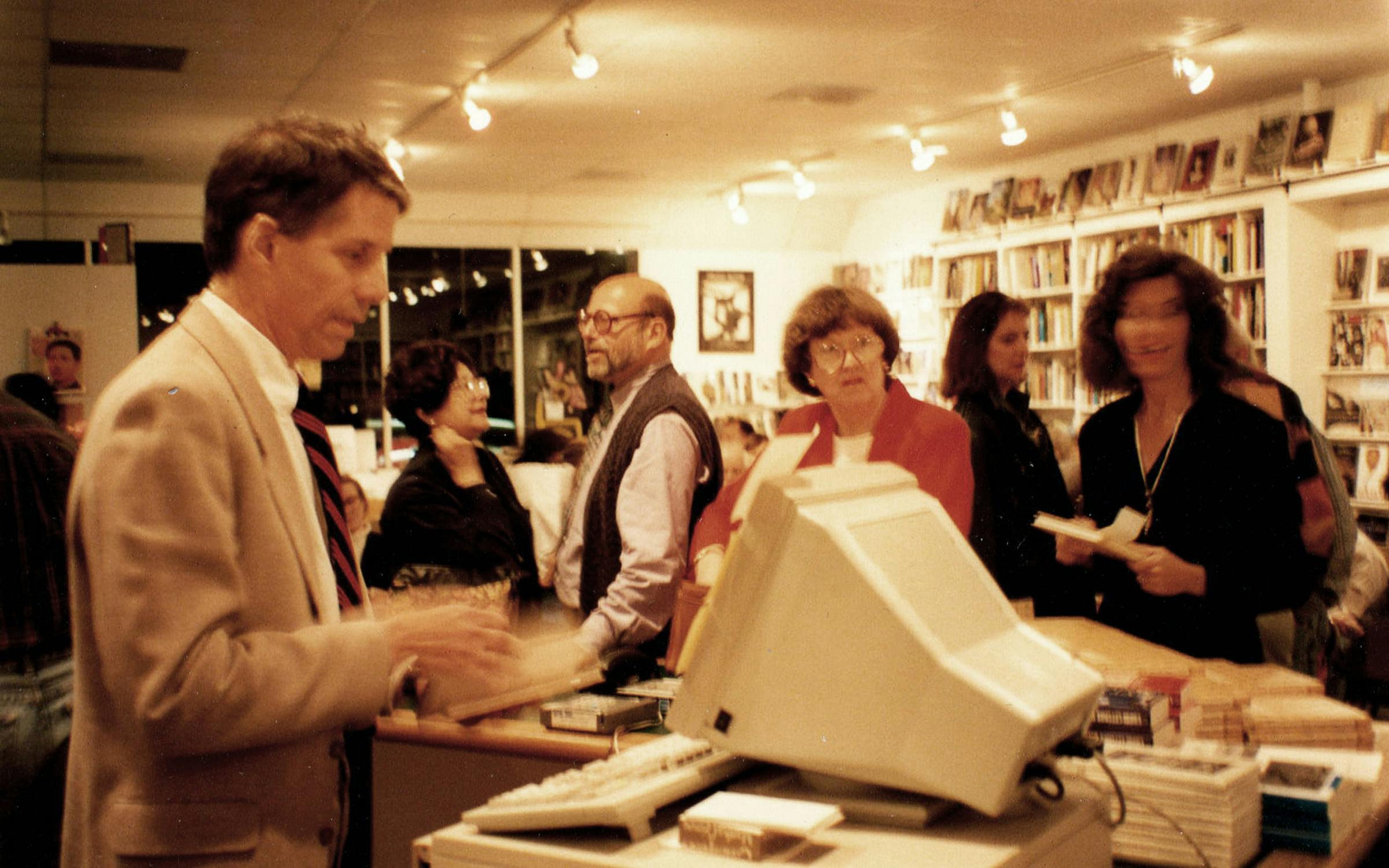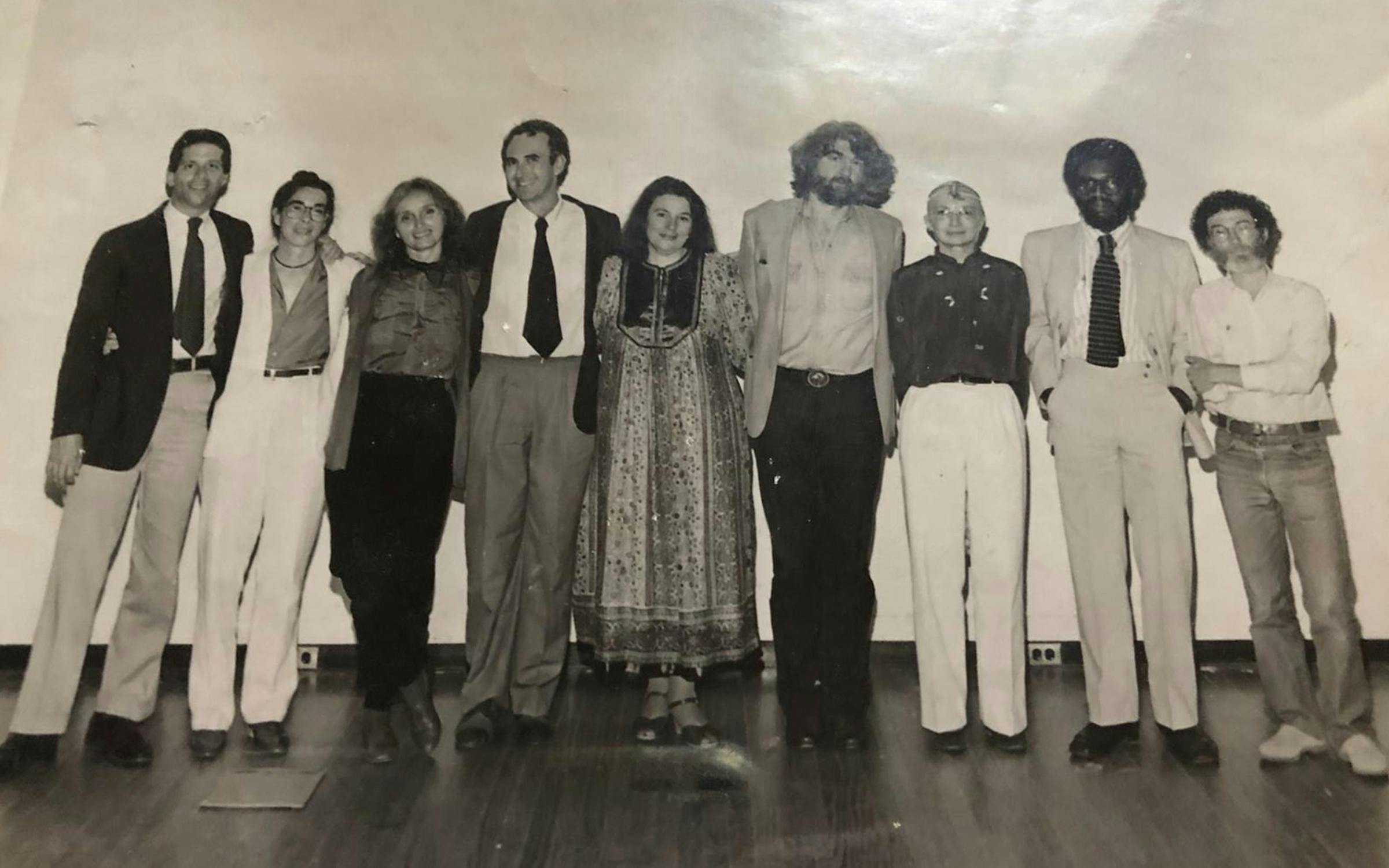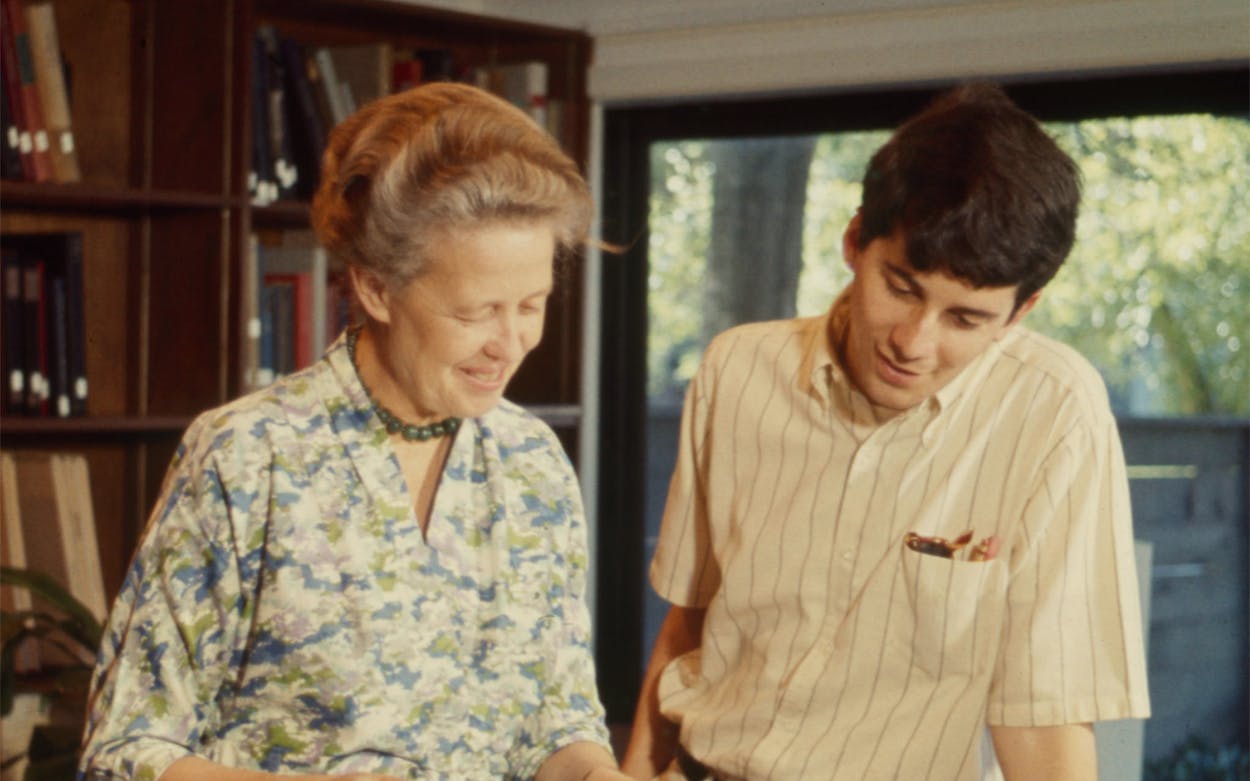When I heard Karl Kilian had died, I took a cherished, framed picture from a bookshelf in my house as a way to pay silent, personal tribute and to remind myself, as I often have over the years, of the moment it captured.
The photo was taken in 1981, when the Bayou City was just beginning to emerge as a national literary hub. The University of Houston’s MFA program was well into its second year, and the international writers’ organization PEN (Poets, Essayists, Novelists) had sanctioned the establishment of a regional chapter, based in Houston, called PEN/Southwest. To mark the occasion, local PEN members had thrown two big conferences on the UH campus, featuring such stars as Susan Sontag, Donald Barthelme, and Grace Paley. Things were happening.
Soon after Karl opened Brazos Bookstore in 1974, I wandered in. The store was (and still is) located on Bissonnet Street, not far from where I lived, and naturally he was there, because at that time, he pretty much always was. Though my résumé was then unimpressive—I’d published one short story and, like a slew of other people in town, was working on a novel—Karl immediately took me seriously. He was that open to possibility and whatever came next. We talked for maybe an hour. He was wildly energetic, both physically and mentally. His mind whizzed from one topic to the next; conversation with him jumped and flew. He loved books and Houston. I wanted to be a part of both, and Karl was always happy to give a newcomer a hand.
But back to the photograph. It was taken on the University of St. Thomas auditorium stage. Eight writers are lined up side by side in front of a white dropcloth, with Karl, our organizer and master of ceremonies, anchoring the group on the left. We were there to read from our work, as part of a fund-raiser for Friends of PEN/Southwest, a group Karl had set up. The house was packed and buzzing, with all four hundred seats occupied. There was no admission charge, so struggling young writers were welcome, but donations and memberships were readily accepted. Checks rolled in. To enliven the evening, Karl had encouraged us to read from something new, maybe as yet unpublished. He’d also set down our marching orders. Eight were too many readers to make for an enjoyable evening if even one of us went on too long. The night was not about us. We each had ten to twelve minutes only. We promised to be brief.
We were a smash. Money rolled in. Karl’s widow, Kathy Davidson Kilian, who worked with him in the bookstore for many years, says she thinks that was the night Karl declared himself—perhaps primarily to himself—as a man willing to go all out, beyond what was expected, to do what he could to make brave, good things happen in the city he loved.

Karl grew up in Houston and earned an English degree at the University of St. Thomas before spending time in New York City, where he worked in an independent bookstore. That experience sparked the dream of opening a similar store in Houston—a place that would be more than a store, but also a community for writers and readers. For nearly a half-century, Brazos has been exactly that, enduring despite all the challenges (big-box competitors and the COVID-19 pandemic among them) that have forced so many indie bookstores to close.
As for the eight writers in that photo from 1981, we were distinctly emblematic of Houston—a motley group of transplants. From right to left in the photo, we are: Max Apple, short-story writer, in scruffy jeans and the attitude of a recalcitrant street kid; poet Lorenzo Thomas, elegant in a pale suit and tie; June Arnold, novelist, hairless from recent chemo treatments, a necklace draped over her head like a diadem; Stan Plumly, poet, most notable for his abundant, flowing locks; Cynthia MacDonald, also a poet, in one of her ankle-length flowing dresses; sport-coat-and-tie attired Phillip Lopate, essayist; me in clip-on bow tie and boyish getup; fiction writer Laura Furman, her thick black hair up in a knot, in white; and Karl.
We did everything he told us to, and of course he was right. The evening was bright, quick, and peppy with promise. The audience was with us. Everybody was invited to a very big party afterward at the home of Houston Post owner and writer Diana Hobby. Houston literary life moved forward yet another step that night, led by the man best suited to show the way.

Karl’s energies never flagged. Two years later, he cofounded Inprint, a literary arts nonprofit that still thrives today, giving grants to aspiring writers and arts organizations. He watched over the expansion of Brazos Bookstore and its relocation to a new site across the street, staged readings, hosted parties, and, in 1988, married Kathy, taking on a full-hearted new role as stepfather to her three children. Kathy figures that in her time working in the bookstore and as Karl’s wife, they must have given a thousand dinner parties for visiting and local writers. Karl was crazy about those evenings at home. Before guests arrived, he’d pick out selections from his great stack of eclectic vinyl to play jazz, maybe classical, or, if the occasion called for it, Bruce Springsteen, Tina Turner, or the Police. When Karl was nominated for membership in the Texas Institute of Letters, one council member reminded us that, well, he wasn’t a writer. Nobody said anything in response; we just voted him in.
In 2006, Karl retired from Brazos Bookstore and went to work as program director for the Menil Collection. He stayed there until poor health forced him to retire. In 2015, he and Kathy moved to Austin, where he died on December 9 at age 77.
Only four of the nine of us on the St. Thomas stage yet survive: Max Apple, Phillip Lopate, Laura Furman, and me. When I asked the other three for comments about Karl, two answered right away. “Karl reimagined Houston as a place where everything was possible, and it was just a matter of making up your mind what you wished to do,” Laura wrote. “He was brilliant, funny, and a real friend.” Philip reflected: “He was inimitable: proof positive that one person can make such a difference to a city and its cultural life.”
One day in 1989 I went in the store and Karl said he had something for me, a rolled-up copy of a poster advertising the publication of a book of Annie Leibovitz’s Rolling Stone photographs, featuring Tina Turner on the cover. “This,” he said, “belongs to you.” This was typical Karl: always thoughtful, he’d remembered what a big Tina fan I was.
What a guy. The poster hangs in my bathroom, and the 1981 photograph is back in its place on the bookshelf.






